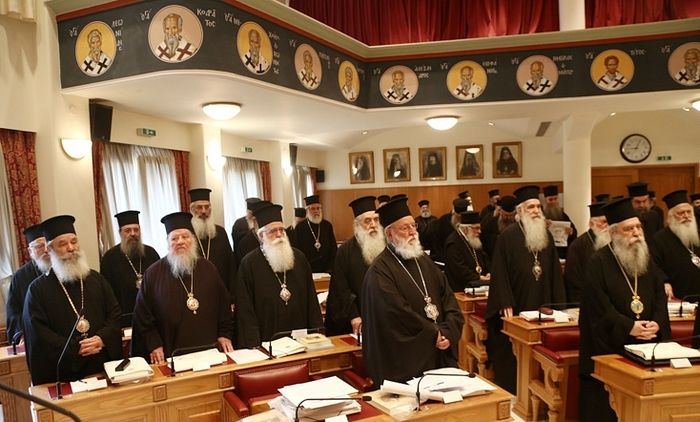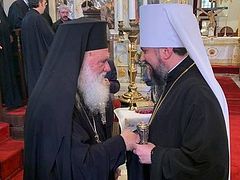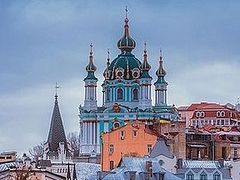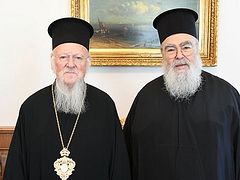Athens, October 15, 2019
In March, the Holy Synod of the Greek Orthodox Church created a commission on dogmatic and canonical issues and a commission on inter-Orthodox and inter-Christian relations to examine the Ukrainian issue in depth. They eventually issued a joint conclusion that there are no obstacles to the Greek Church recognizing the schismatic “Orthodox Church of Ukraine” (OCU).
Metropolitan Ignatius of Dimitriados, the chairman of the Synodal commission on Orthodox and inter-Christian relations, read a report, “Ukrainian Autocephaly and the Responsibility of the Spirit,” to the hierarchs gathered in an extraordinary session of the Bishops’ Council on Saturday.
In his presentation, the text of which is published on Romfea, Met. Ignatius called the hierarchs’ attention to five points:
-
The Ukrainian Orthodox people
-
The role of the Russian Orthodox Church
-
The Ecumenical Patriarchate and its duty
-
The Church of Greece and its unity
-
Geopolitical developments and national issues
The Ukrainian Orthodox people
Following on what Archbishop Ieronymos had said in his presentation (which we reported on here), Met. Ignatius notes that “we are dealing with the Orthodox people of an independent state, as Ukraine is today… millions of souls of Orthodox believers, who have suffered over the course of history, either from Poland, or from Russia, up to our days.”
The discussion of the validity of ordinations in Ukraine and the behavior of bishops must always bear in mind the millions of souls involved, the Greek hierarch states.
He notes that the hierarchs of the canonical Ukrainian Church did request autocephaly from the Moscow Patriarchate following the fall of the Soviet Union. “This initial request was authentic. The fact that it was also signed by today's Metropolitan Onuphry is a strong indication that it was a universal request, of all the people and of the hierarchy’s sympathy, to detach themselves from the Russian hierarchy and the commitment they had up until then.”
Interestingly, no mention is made of the fact that many of the bishops, including Met. Onuphry, later revoked their signatures, explaining that they had signed under duress from the tyrannical Philaret Denisenko, the canonical Metropolitan of Kiev at that time.
Moreover, no mention is made of the fact that that same Met. Onuphry and the 100 bishops in his Church have declared several times that they are not interested in seeking or receiving autocephaly. It is not clear why a 30-year-old request should take precedent over the current needs and desires of the Church.
Met. Ignatius continues by lamenting that autocephaly was not granted in the 1990s and that the issue remained.
However, as Constantinople asserts, and as Met. Ignatius will later assert, it is Constantinople’s right to grant autocephaly, so how can they blame the Moscow Patriarchate for not granting autocephaly?
The role of the Russian Orthodox Church
Met. Ignatius begins his examination of the role of the Russian Church by denigrating his brothers in Christ, saying that for them, being Russian is more important than being Orthodox, which, he claims, has been evident since the fall of Constantinople.
Recall that the Russian Church remained faithful to Orthodoxy while the Patriarchate of Constantinople wandered in Uniatism following the fall of Constantinople.
Recall also that Metropolitan Chrysostomos of Dodoni explicitly stated that the Greek Church must stand with Constantinople because it is Greek. Patriarch Bartholomew himself has spoken about the special role of the Greek people in the Church, which the Slavic people need to learn to accept.
“While the Russian Church had every opportunity to solve the problem by leading things to autocephaly, or at least to a solution that would be acceptable to the Ukrainian people, unfortunately it did not,” Met. Ignatius continues.
Everything changed after the invasion of Crimea, he states, and now no one believes the Russian Church is capable of providing an acceptable solution to the Ukrainian people. “The solution will never come from there,” he writes, playing on the anti-Russian sentiments of some Ukrainians.
Met. Ignatius then turns to the topic of the Crete Council and the preparations for it. The Patriarchate of Constantinople and bishops aligned with it have increasingly made it clear that the Patriarchate’s actions in Ukraine are in large part a punishment for the Russian Church having not attended the Council.
Autocephaly was among the topics discussed at the pre-conciliar sessions. According to Met. Ignatius, “In the 1980s, the Ecumenical Patriarchate seemed to consent to the relativization of its privilege. In a very rigorous process, he demanded a pan-Orthodox consensus to give any autocephaly.”
It is curious that if it was the Ecumenical Patriarchate that called for a pan-Orthodox consensus on granting autocephaly, it is now the Ecumenical Patriarchate that is avoiding a pan-Orthodox consensus.
The procedure for granting autocephaly was agreed upon, save for the manner in which a new tomos was to be signed. While all agreed that the Patriarch of Constantinople should sign first, and that the Mother Church of the Church now receiving autocephaly should also sign, Constantinople wanted its signature to be given special distinction, whereby it would be indicated that Constantinople “decides” to give autocephaly, with other signing Churches “co-deciding” or “deciding together.” The Russian Church counter-proposed that all Churches sign equally.
As Met. Ignatius writes, the Russian Church delegation, headed by Metropolitan Hilarion (Alfeyev) was persistent, as per Patriarch Kirill’s instructions, in rejecting Constantinople’s proposal.
“Their persistence was terrible,” the Greek hierarch writes, noting that he personally pleaded with the Russian delegation, saying, “You have the Ukrainian situation in front of you. Don't you see it? Can't you see what will happen?”
It cannot be denied that the Russian Church’s brand of diplomacy is often not well received by the other Local Churches, and has certainly caused it troubles in the Ukrainian crisis. Many of the other Greek hierarchs who spoke at Saturday’s session focused not on what is canonically correct, but complained precisely about the pressure they felt they received from Russian Church representatives, and Alexandrian hierarchs also recently complained about the Russian Church’s “aggressiveness.” A Bulgarian hierarch recently lamented the perceived belittling of the Bulgarian Church by both the Moscow and Constantinople Patriarchates.
However, what Met. Ignatius fails to mention is that the majority of Churches agreed with Moscow’s proposal for how to sign a tomos of autocephaly. As Metropolitan Hierotheos (Vlachos) testifies, the Churches were divided 8-6.
Met. Ignatius then makes the bizarre claim that the Russians’ persistence in the matter stemmed from its refusal to admit in dialogues with the Catholic church that there is a primacy in the east. However, the Greek hierarch is unfortunately failing to understand that a debate about what primacy means is not the same as a debate about whether primacy exists.
In any case, he notes that as a result of the debate over signing, the topic of autocephaly was dropped from the agenda for the Crete Council. “If it had been discussed there, today there would be no issue,” he writes.
However, there has never been an explanation from the Constantinople side for why it is acceptable to trash the pan-Orthodox agreements made in preparation for Crete.
He also laments that the Russian Church did not attend the Crete Council in the end—something which Pat. Bartholomew takes great personal offense to.
The Ecumenical Patriarchate and its duty
“Everyone recognizes that [Constantinople] had and has the right to give autocephaly,” Met. Ignatius writes, and thus Pat. Bartholomew was carrying out his duty in Ukraine, especially given that the Russian Church supposedly has no chance of solving the situation. “The Patriarchate is looking out for human souls,” he writes.
Again, if autocephaly is Constantinople’s duty, then Moscow cannot be blamed for not giving autocephaly to Ukraine.
He continues: “The attribution of autocephaly is a prerogative of the Ecumenical Patriarchate, but it does not negate the entity and presence of Onuphry and the Russian Church presence in Ukraine. This is not affected.”
However, recall that Pat. Bartholomew himself wrote to Met. Onuphry last October to inform him that once the “unification council” came in December, he could no longer canonically be called the Metropolitan of Kiev.
Moreover, if the Patriarchate of Constantinople is to be the guarantor of Church unity and defender of the canons, it is unclear why it is then creating non-canonical situations with overlapping jurisdictions, as it previously did in Estonia. The Patriarchate has been wildly inconsistent on this matter. At the same time as it was preparing to create an overlapping jurisdiction in Ukraine, it dissolved the Archdiocese of Russian Churches in Western Europe, claiming it was incorrect to have overlapping Russian and Greek dioceses.
“This does not change [the UOC’s] status, it does not concern them, it does not lead them to schism. The Ecumenical Patriarchate does not cease communion. They cut off communion with him. The Ecumenical Patriarch continues to commemorate Patriarch Kyrill in the diptychs,” Met. Ignatius continues.
While the Ukrainian Church under Met. Onuphry may still be considered officially canonical, the Patriarchate of Constantinople has been ignoring its existence since last summer. Moreover, the actions of Constantinople in Ukraine have the direct consequence of the canonical Ukrainians being persecuted and beaten. Nothing is said of this in Met. Ignatius’ report.
In noting that Constantinople has not broken communion with the Russian Church, the Greek hierarch is attempting to paint the Russian Church as the aggressor, when, in fact, the rupture in communion came only as a response to the aggressive actions of Constantinople.
The Church of Greece and its unity
Met. Ignatius begins this section by referring to Article 3 of the Greek constitution, which he states is not so much about the relations of Church and state, but about the unity of the Greek Church with the Patriarchate of Constantinople—”A unity we cannot cross, we cannot in any way jeopardize because it concerns the unity of our Church Body, our own hierarchy.”
As OrthoChristian has noted many times, the Greek Church is in a unique situation where a large portion of its bishops, who are fully involved in making decisions for the Greek Church, are actually hierarchs of the Patriarchate of Constantinople. That is, the Greek Church has no ability to make decisions without input from Constantinople.
Met. Ignatius writes that the bishops of the “New Lands,” who are ultimately hierarchs of Constantinople, participated in the Synod in Constantinople that decided to create a new, autocephalous church in Ukraine.
“We should never engage in conflict with the Ecumenical Patriarchate on the Ukrainian issue, because that would result in our own division, our own post-problematic relationship with the Ecumenical Patriarchate. Why would we do that?”
That is, in Met. Ignatius’ estimation, the Greek Church must side with Constantinople, not as a matter of dogmatic or canonical correctness, but in order to avoid creating unpleasantries for itself.
Geopolitical developments and national issues
“Undeniably, all this has geopolitical dimensions,” Met. Ignatius admits. All autocephalies have always involved geopolitical factors, he adds. “I am sorry if some do not understand what is happening in our time, where we belong and what responsibility we have for the results,” he states.
On the contrary, it is very clear to many that it is precisely geopolitical factors that drove Constantinople’s decision to create a new church in Ukraine. Ex-President Petro Poroshenko openly spoke of the autocephaly project as part of his political program, and the U.S. State Department makes no attempt to hide its involvement in the matter.
“What the Russian Church will do, after our recognition, is up to it,” he writes, showing an apparent lack of concern for unity between the Local Orthodox Churches. The Russian Church is “anti-ecclesiastical,” he asserts, which also applies to the way in which it supposedly interferes in the Greek Church’s own autocephaly, which proves, he believes, that the Greek Church must stand with Constantinople and recognize the Greek Church.
The Russian Holy Synod is currently scheduled to meet on Thursday to discuss the Greek Church’s latest decisions.





